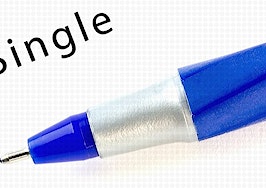Cara Ameer, a top-producing broker associate from Northeast Florida, writes about working with buyers and sellers, sticky situations and real estate marketing in her regular Inman column that publishes every other Wednesday.
Ah, the open house. This is a critically important event in new agents’ careers. It is often the first public appearance, if you will, for agents to showcase themselves to the community and beyond. Everyone is watching — the security cameras connected to the doorbell, the neighbors, colleagues, friends and, of course, the listing agent and the seller who agreed to let the agent host the event.
First impressions matter. Not only of the house for sale, but also the agent representing it, even if they are only doing so for the day. Doing or saying the wrong thing or providing bad information could derail a potential deal. Words and actions matter.
This is the time to show everyone that you are a step above the rest. Here are 10 things new agents must know about holding open houses for another agent.
1. Represent well
Although it might seem obvious, it bears repeating that at all times you are an extension of the listing agent, the property you are representing and the seller. You are also representing your brokerage’s brand, reputation and goodwill. Everything you do is a reflection of this as well as your appearance.
It is important to look professional and well prepared, no matter the location of the property. Just because everyone may be walking into the open house in shorts and flips-flops does not mean that you should be dressed the same way.
People walking in should know who the real estate agent is versus the visitors. Communication and the way you interact with people should be courteous and friendly in a relaxed manner, but with a professional undertone. Be approachable, but not informal, as if you were hanging out with friends.
2. Know it, and own it
Ever attend an open house and the agent who was present could not answer basic questions? Every response was, “Let me check on that,” or “I don’t know.” Or even worse, the agent attempted to fake their way through an answer that really showcased that they didn’t know anything?
An agent hosting an open house should be laser-focused and know as much as they can about the home they are representing, as well as the neighborhood and relay information with confidence. Details matter. This goes beyond the number of bedrooms, baths and square footage as anyone can look that up. Several other items to know:
- The lot size (with copies of survey or plot plan available for reference)
- Who the builder was (if it can be determined depending on age of the home)
- Upgrades and improvements
- Average cost of utility bills as well as property insurance (common question in hurricane- or fire-prone areas)
- General age of systems and structures of the home
- Understanding the homeowner’s association fees and community development district or Mello-Roos fees (and what that includes) if applicable or other special assessments specific to the area, etc.
- How much the property taxes are
- The number of homes in the subdivision (if applicable)
- Neighborhood amenities and where they are located (if applicable)
- The schools that the home is zoned for as well as what other schools are located within a comfortable proximity from preschools to colleges
- Location of key attractions: shops, restaurants, services, places of worship, employers, hospitals, etc.
- Basic knowledge of general commute times to and from places people work, the airport, etc.
- Location of commuter train stations, bus stops, public transportation, etc.
3. Understand comparables, the neighborhood and the competition
Every agent hosting an open house should have an understanding of active, under contract and recently sold comparables in the neighborhood. They should have this information with them for reference so they can speak intelligently when interacting with prospects.
They should know how the current competition compares to the property being held open and what options are available, not just in the immediate neighborhood but adjoining communities, including new construction.
The open house agent should have a solid understanding of the average sold price, days on market and percent of listing to sold prices in a community. They should also know what kind of financing is most common in the community: conventional, VA, FHA, first-time homebuyer programs, or if there is a prevalence of cash sales.
They should also know about rentals in the neighborhood as well as their going rates. This may help with prospects who are considering renting first and/or may consider buying if the rental prices are higher than what a mortgage payment may be.
4. Preview, preview, preview
To have an effective open house, you should preview the property you are looking at ahead of the open house as well as a couple of others that are considered immediate competition if you can. A thorough drive through of the neighborhood and the surrounding area is a must if you are not familiar with it, so you have an understanding of where things are in relation to the house.
5. Smile, and treat everyone as a prospective buyer
You never know who may be coming through the open house. It could be the seller themselves (who you may not have met) or a friend, neighbor or family member that they have sent to check on how things are going. They could pose as a prospect and “secret shop” you.
Be careful. You can never assume anything you say is not being recorded or fed back to another party in some way. Your words and actions could potentially put the listing in jeopardy for the listing agent.
An agent colleague of mine in another market recently recounted how they had lost a listing after agreeing to let an agent conduct an open house for them. The seller had forgotten something and returned to the home. The hosting agent, unaware who the person was, engaged in conversation about the home in a less than favorable light. Subsequently, all of this got back to the listing agent, and the seller elected to terminate the listing agreement.
6. Prepare talking points
Treat the open house as if you were hosting a live television segment about the listing. As any good television host knows, you need to prepare talking points ahead of time, and an open house is no different.
Collaborate with the listing agent on the important points they want discussed and strategize on how to respond to any potential objections about the property based on their experience with the listing.
This will help minimize any faux pas or potentially awkward exchanges if you are being “secretly shopped.” An open house event is never a forum to publicly criticize the home. Even if it is overpriced or the condition is dated, find a way to position it in a positive light. Every home has positives and less-than-positive things, and prospects are unabashedly critical when going through a home, whether they are in the market to buy or not.
7. Do not leave early
There is nothing worse than an agent hosting an open house who shuts off the lights 20 minutes before it ends. This is not a “clock in/clock out” job where you want to be in line to have your timecard stamped.
Accept the fact that you will need to likely stay past the end time because people always tend to stop in without any regard to the official schedule the home was being held “open.” There are always stragglers, and that one person could turn out to be a powerful connection.
Besides, leaving early is disrespectful to the listing agent and the seller.
8. Don’t overstep your bounds
Although you are doing an open house to meet potential prospects, there could be situations where people coming in have an agent they are working with or they ask about the listing agent because they want to talk with him or her.
Respect those requests, and stay in your lane when it comes to other people’s customers. There is enough business out there for everyone who wants to work hard and persevere in this industry.
If you attempt to run interference with another agent’s customers, it may come back to bite you. Be sure to let the listing agent know if someone stopped by to see them, and get their contact information so the agent can follow-up.
You would appreciate the same courtesy.
9. Promptly follow up
Provide prompt feedback to the listing agent after the open house event with the number of people that came through, and what you were able to glean from the traffic as far as serious buyers, lookers, neighbors, etc. Relay any feedback you have based on your conversations and interactions, as well as what questions that were asked.
Follow-up with prospects as well, thanking them for attending the open house and asking how you can be of assistance.
10. The only guarantee is there are no guarantees
One of the most difficult things for a new agent to understand about open houses is the likelihood of instant gratification – a true buyer or seller lead may be a rarity versus the norm.
Real estate is anything but an instant gratification business, and it is often a series of steps and processes to achieving success. Consistency is key, and the more you put yourself out there and the more open houses you host, the more likelihood you will build a roster of prospects to work with.
Cara Ameer is a broker associate and global luxury agent with Coldwell Banker Vanguard Realty in Ponte Vedra Beach, Florida. You can follow her on Facebook or Twitter.








